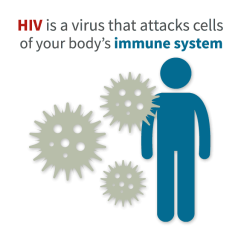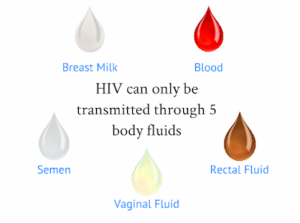HIV stands for Human Immunodeficiency Virus. It is a virus that weakens the immune system and open the body up to opportunistic infections. These infections are opportunistic because they take advantage of a person’s weakened immune system and can cause great harm.
If left untreated, HIV can lead to AIDS – but with testing and early treatment, someone who is diagnosed with HIV can live a long and healthy life. In fact, if someone is on medicine with an undetectable HIV status, they cannot transmit the virus to sexual partners. This is called Undetectable=Untransmittable.

HIV is most commonly transmitted through unprotected anal, oral, and/or vaginal sex or by sharing needles. HIV can be transmitted whenever there is mixing of these fluids:
- blood
- semen (including precum)
- rectal fluid
- vaginal fluid
- breastmilk

Using a form of protection, such as inner or outer condoms or PrEP, can reduce your risk of being diagnosed to HIV. Getting tested regularly (every 6 months) and knowing your partner’s/partners status are great ways to take control of your sexual health.